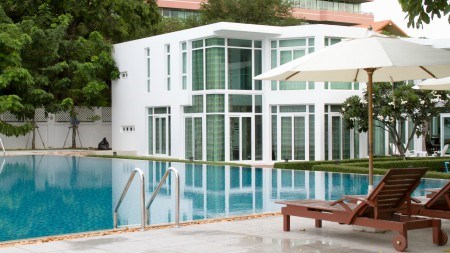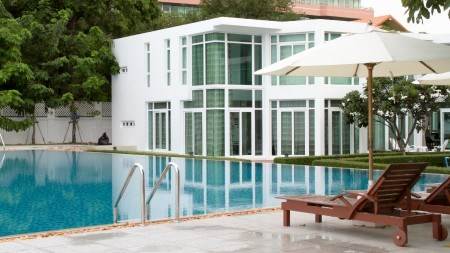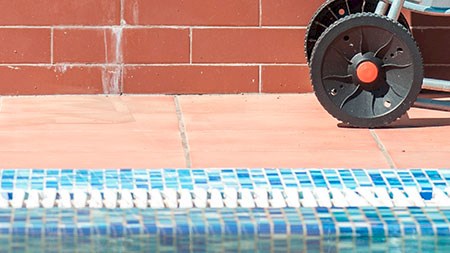What to consider before buying a house with a swimming pool, or installing one on your existing property.
When temperatures soar in mid-summer it can be tempting to call up swimming pool installation contractors for quotes. Or, if you are in the market to buy, you might opt to put a swimming pool high on your list of requirements.
But before you take the plunge, it’s wise to consider all that owning and managing a swimming pool entails.
Questions to ask yourself
Will it add value to my property? Most estate agents say a swimming pool doesn’t increase the market value of a property. However, some buyers will no doubt find a pool attractive, so this feature may well be the element that closes the deal in your favour when you decide to sell.
How often will I use the pool? If you are a regular swimmer, or have young children who enjoy swimming, you will probably get the most use out of a sizeable pool. If the answer is ‘during a few weeks in summer’ it’s probably best to spend your money on other features.
Benefits
The benefits include having an attractive water feature on your property that also provides a pleasant form of exercise without having to leave home.
The downside
- Upkeep costs – Pool chemicals need to be applied regularly, and in the correct ratios. Even if you have a saltwater chlorinator, you still need to take into account the cost of replacement salt as well as pool acid and testing equipment.
- Water costs – Swimming pools - even small plunge pools - use large quantities of water, which will significantly increase your utilities bill.
- Effort - Keeping a swimming pool in good condition requires regular cleaning, backwashing, filling and monitoring of chemical levels. This takes time and effort, so if you would rather spend your time watching television, this type of activity is probably not for you
H2O
Water is scarce throughout South Africa, and many municipalities have restrictions – and even bans – on the use of municipal water for filling swimming pools, splash pools and Jacuzzis.
If water usage is severely restricted in your area you will need to look carefully at alternative water sources, such as boreholes or well-points. Many of these sources deliver water that contains high percentages of metals and chemicals that could destroy the pool lining. Instead of an inviting blue, your pool could turn into a green monster.
You need to have well-point and borehole water quality professionally checked before using it in a swimming pool.
If you go ahead..
If, after weighing up the pros and cons, you decide that a swimming pool is a must, you need to decide how you are going to keep your pool clean and free from harmful bacteria.
Chlorine is the chemical most often used to keep swimming pools and Jacuzzis free of bacteria that can be hazardous to humans. The chlorine solution in the water breaks down into many different chemicals, including hypochlorous acid (HOCl) and hypochlorite ion(OCl-). Both kill microorganisms and bacteria by attacking the lipids in the cell walls and destroying the enzymes and structures inside the cell, rendering them oxidised and harmless.
Saltwater chlorinating systems - Salt chlorine generators create chlorine from sodium chloride (salt). When the pool pump is on, the salt water travels through the circulation system, entering the salt chlorine generator and passing through a salt cell. As the salt water flows through the cell, a low-voltage direct current is applied to plates inside the cell, initiating electrolysis. This results in the salt and water breaking up into hydrogen gas and hypochlorous acid. The hydrogen gas leaves the swimming pool water in the form of small bubbles. The hypochlorous acid sanitises the pool water and ultimately reverts back into salt, and the process is repeated.
To operate effectively, the swimming pool water must have a salt concentration of 3 000 ppm (parts per million), so it’s important to maintain the correct salt levels. Salt chlorine generators require few, if any, additional chemicals, as they produce nearly neutral pH levels. Other advantages include: reduced skin and eye irritation and no harsh chemical odours.
Salt is corrosive but will not damage equipment if maintained within the normal operating range. However, if allowed to increase in excess of 6 000 ppm, high salt concentrations can contribute to the breakdown of handrails, lighting systems, and swimming pool liners. Care must be taken if splash out pool water is continually pooling and evaporating, as the resulting salt concentration will increase in that area, and could cause salt damage unless it is rinsed off, or diluted by rainfall.
Other disadvantages include: high initial costs and high cell replacement costs.
Other chlorinating systems – There is a wide range of chlorine pool products on the market, including tablets, liquids and powders that must be added to the water together with other chemicals, after regular testing.



